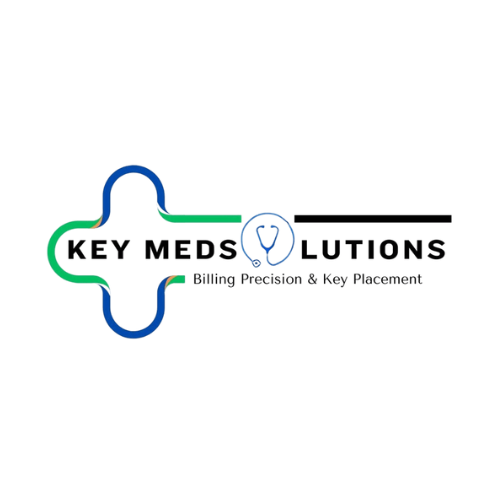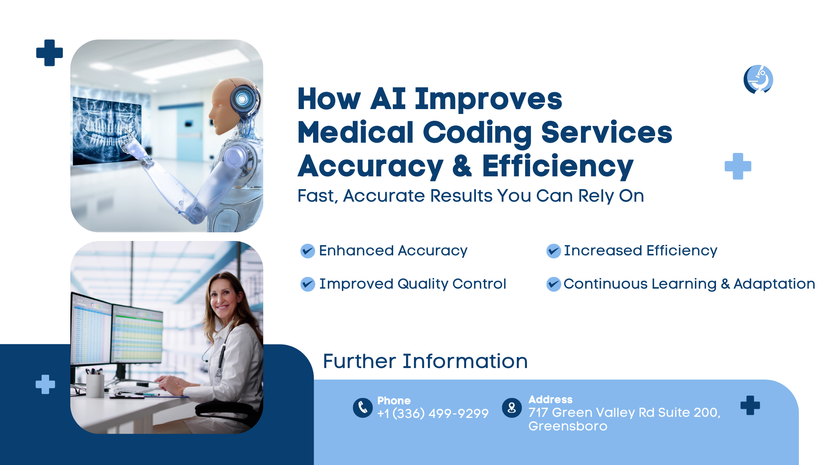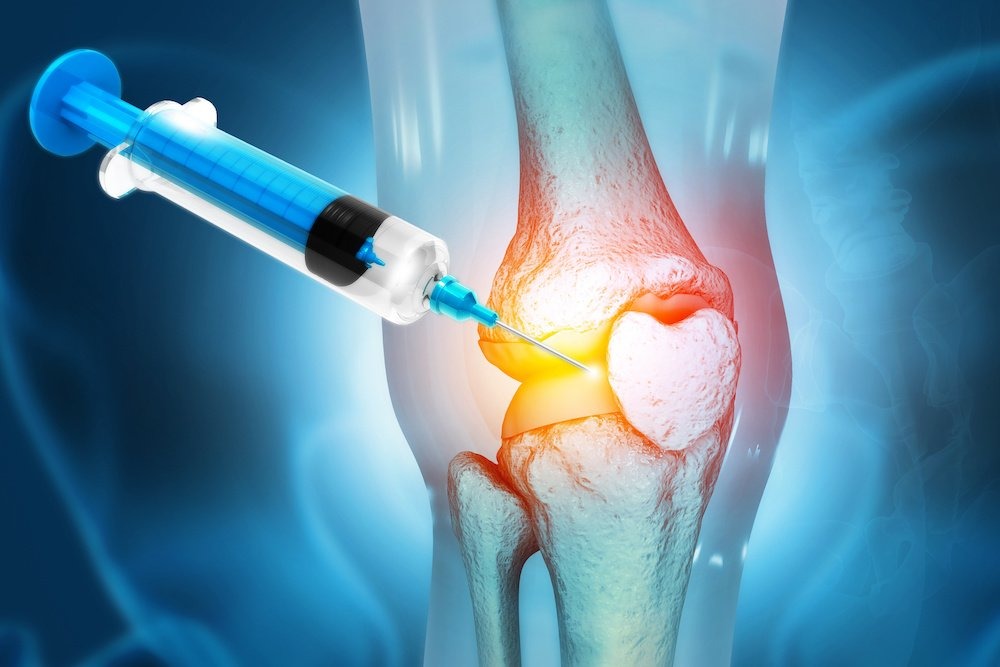Enhancing Medical Coding Services with AI for Better Accuracy & Efficiency
The accuracy and timeliness of medical coding are considered the lifeblood of the healthcare provider’s financial cycles. Medical coding is a key part of the whole medical operation which converts patients’ complex clinical documents into simpler electronic formats. This is done through the use of diagnostic codes, and is also important for billing, reimbursement, compliance, research, and quality reporting. However, the seriousness of the task notwithstanding, the medical coding process is yet to be partially manual labor and at the mercy of fallible human judgement.
According to a research by the AHIMA (American Health Information Management Association), 9.5% is the average error rate for medical coding. Such discrepancies can entail claim rejections that imply costly health insurance, further lead to potential liabilities, and result in income loss for the providers and facilities of the health care sector
The Challenges of Medical Coding and Documentation Services
There is perhaps no greater challenge faced by healthcare providers and medical coding companies than the variability and ambiguity in clinical documentation. Different physicians often use varying terms, abbreviations, or notations to describe the same condition or procedure. For instance, a patient with chest pain may have their condition documented as “angina,” “myocardial infarction,” “acute coronary syndrome,” or simply “chest pain.” Incomplete, inconsistent, or unclear records only result in confusion for coders, who then fail to accurately assign the right codes.
This is why the cream of the crop healthcare organizations prefer to collaborate with professional outsourcing partners to avail themselves of end-to-end medical coding and documentation services or employ the latest technologies in order to enhance their performance.
How AI is Transforming Medical Coding Services and Solutions
AI has been identified as a potent weapon to solve the fundamental issues of medical coding services in recent years. AI oligarches the extraction and comprehension of clinical data through the process of automation which can lead to not only improved coding accuracy but to faster workflows and lesser compliance hazards.
Moreover, cutting-edge medical coding outsourcing services are now mixing artificial intelligence and natural language processing (NLP) to consolidate the coding process and still keep the human control in place.
The possibilities of how AI redefines the future of medical coding services and their solutions are given here:
1. Improved Accuracy
A great amount of clinical details can be processed by AI algorithms and verified through the application of standardized coding guidelines. Artificial intelligence is capable of recognizing patterns in the unstructured document and with the help of machine learning and natural language processing, it can assign the most suitable codes more accurately than manual work, therefore significantly decreasing the number of errors in coding and denials of the claim for the providers who are using professional medical coding services.
2. Greater Efficiency
Manual coding is a method that is not only time-consuming, but also very demanding in terms of workforce, which tasks can now be significantly reduced and automated with AI, coders working on the more difficult cases only. This enhanced efficiency has an impact on healthcare organizations’ capabilities to file faster and more accurate claims, which in turn helps the #1 medical billing company in the US or any top-rated medical billing services provider to perform the adequate task of getting their payments in time.
3. Better Quality Control and Compliance
AI-powered tools are really fast machines that can, in real-time, compare medical codes with the industrial coding guidelines being developed, which thereby can identify any differences that may be compliance risks. As for the medical coding company, this improvement implies that their sanctions will especially be dealt with in a more organized way and the number of errors that would cause a regulatory investigation will be significantly lower. When AI is combined with human review, it reasonably ensures that the coding remains within the high quality standards and is in line with the requirements of HIPAA and ICD-10-CM/PCS.
4. Continuous Learning
One of the advantages of AI is that it can be continuously learning. Through the application of machine learning, the models of AI decode their behavior as they absorb more data and also adapt to the feedback resulting from the experiences of their human coders. This is the way medical coding services and solutions can be seen to promote the use of AI so that they can follow the ongoing changes in the coding updates, payer guidelines, and the industry in general, and thereby the solution will clearly be future-oriented to the organizations within the healthcare sector.
5. Support for Complex Coding Scenarios
There are some specialties and medical cases that are obviously more difficult. Traditional health technologies can benefit the most from AI support coders in real-time databases based on wide-reaching medical expertise for example multi-specialty practices and hospitals. The Aid of AI not only does not obviate the requirement of professional coders but also complements the work of these teams engaged in medical coding outsourcing services. While the coders can handle the high volume of tasks, the complex decision-making is done by the qualified professionals.
6. Key Considerations: The Human Factor
Despite the ongoing improvement of AI in medical coding and documentation tasks, nothing can replace human knowledge. Clinical data often come with errors, such as inconsistencies, omissions, or uncertainty, and only a skilled coder can accurately decode it. In the light of this, the top medical coding services are built on a foundation of the AI-powered part and coding professionals with measurable skills.
Human control is a necessity for audit defense as well as the relationship between coders, providers, and clinicians, which is built on the trust that arises from the understanding that erreast important for successful medical billing and medical auditing processes. When engaged in the process of auditing, the clinical information has to be very concise, to the letter, and in congruence with the relevant coding- an aspect that dominates the success of medical billing and medical auditing.
7. Compliance and Data Security
In modern medical coding services, a critical factor that needs to be maintained is compliance with the rules and regulations. Every AI tool that is going to be used has to be HIPAA compliant and meet the stringent security requirements for the data. It should be noted that computer-assisted coding programs have to be updated regularly and tested to make sure that they are in line with the current coding guidelines, which can be different locally, as well as by the type of medical discipline.
That is the reason why aligning with a trusty medical coding company or the No. 1 medical billing company in the US is so vital. They provide deep industry knowledge, effective compliance systems guarantees and time-honored workflows using human technology blends that keep the technologies on the forefront while still involving people as well.
Conclusion: The Future of Medical Coding
AI has indeed started to alter normal conditions for service providers who are depending on medical coding services and solutions to be precise and fast. The power of automated tools brings a carefully considered, accurate coding process that has the potential to improve the medical coding sector from its weakest points mainly through workload reduction, coding accuracy enhancement, and revenue cycle outcome improvement.
The purpose of AI is not to kick the human factor out of the medical field. Even the most state-of-the-art medical coding outsourcing services always need to balance technology and people, so the existence of people who are certified coders that know the depth of medical terminology, documentation, and payer requirements is a must.
There is cloud Ai Mr. profit and recent automation technology or the present medical coding and billing services that have not adopted AI for their entire operations yet, however, it is clear that there is a shift in business processes. The stage is set for the introduction of AI strategies. Moreover, in the coming days, most organizations will use AI as part of their systems to ensure precise, complete, and compliant coding and billing.








0 Comments